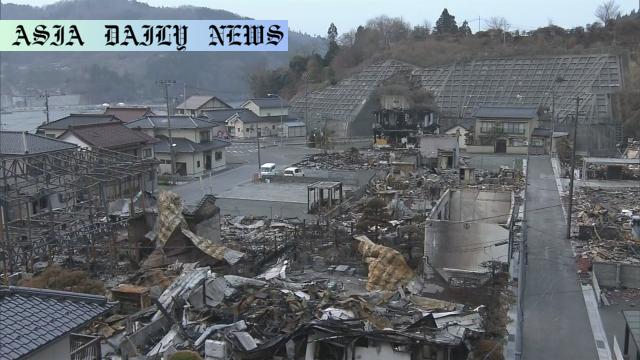Wildfires ravaged Ofunato, Japan, burning 9% of the city and destroying 76 houses. Support for rebuilding remains unclear.
Massive wildfires burned 9% of Ofunato, Japan, affecting 2,900 hectares.
194 people remain displaced in evacuation centers, awaiting housing.
Authorities are preparing temporary housing and rental accommodations.
No concrete strategies yet for restoring fishers’ livelihoods.

Massive Wildfires Devastate Ofunato, Japan
The city of Ofunato in Iwate Prefecture, northeastern Japan, continues to grapple with the aftermath of devastating wildfires that began on February 26. These fires, which destroyed 2,900 hectares of land—accounting for 9% of the city’s area—left a trail of destruction, including 76 homes that were completely obliterated. As of March 9, the fires were declared under control, but ongoing firefighting efforts are focused on eliminating residual embers and preventing a resurgence. Despite progress, local authorities face significant challenges in restoring normalcy to affected residents and addressing pressing community needs.
Displacement and Immediate Relief Efforts
The fires forced many residents to flee their homes, leaving 194 individuals still housed in evacuation centers and temporary accommodations as of last Tuesday. Officials have proposed three primary housing solutions for those displaced: temporary housing, public housing, and privately rented accommodations that can serve as interim shelters. Construction of temporary housing units is contingent on residents’ preferences, with the rollout of some privately rented accommodations expected in April and more comprehensive temporary housing solutions by early May. However, these plans represent only the beginning of a long journey to rebuild lives.
Rebuilding Local Livelihoods
The fires’ impacts extend beyond personal property, with the local economy also bearing a heavy burden, especially the fisheries sector—a critical livelihood for many residents. Fishers’ unions and community members have called for robust and immediate support to revive their operations, but concrete measures from the city and prefectural governments remain under discussion. As a result, many affected families and businesses face ongoing uncertainty, underscoring the critical need for swift and coordinated action to rebuild livelihoods and sustain the local economy.
Challenges Facing Local Authorities
Restoring normalcy and offering assistance to affected residents and industries presents a daunting task for local authorities. Beyond housing and livelihood rebuilding, dangers such as lingering embers and white smoke—identified during a large-scale survey last week—require constant monitoring. Aerial inspections are scheduled in the coming days to prevent any further re-ignitions and ensure safety for residents. Despite these efforts, gaps in long-term planning and support mechanisms remain apparent, calling for greater coordination between local, prefectural, and national governments to address the far-reaching impacts of this disaster.
Path Forward for Ofunato Residents
The road to recovery for Ofunato residents is long and complex. While initial housing assistance and containment measures provide some sense of relief, the absence of a clear and comprehensive strategy for rebuilding livelihoods and reviving industries places many in an uncertain position. Community resilience and revitalization will undoubtedly require continuous focus, funding, and innovative solutions. As survivors navigate this period of transition, their perseverance and unity continue to stand as a testament to human strength in the aftermath of disaster.



Commentary
The Toll of Unpredictable Natural Disasters
Natural disasters, such as the wildfires that ravaged Ofunato, Japan, serve as stark reminders of how quickly lives can change. The physical, emotional, and economic toll of such events is immeasurable. While it is heartening to learn that containment efforts have achieved considerable progress, the fact that extensive work is still needed highlights the complexity of recovery and the importance of proactive measures in disaster management planning.
The Human Cost of Wildfires
For the residents of Ofunato, the past month has been marked by loss and uncertainty. Images of destroyed homes and livelihoods are not only difficult to process but also serve as a rallying cry for urgent action. Temporary housing solutions, although helpful, are not long-term answers. It is imperative that governments and organizations work closely with the community to design a recovery plan that prioritizes not only infrastructure development but also mental and emotional support for the affected individuals.
Challenges in Revitalizing Local Economies
The wildfires’ impact on fisheries and associated industries cannot be overstated. For a community heavily reliant on such livelihoods, disruption to these key sectors poses significant challenges. Authorities’ hesitation to outline concrete plans for economic recovery raises concerns about long-term sustainability. Collaboration with local leaders, experts, and residents must take center stage in designing an inclusive strategy that acknowledges the specific needs of every stakeholder.
Hope Amid Adversity
Despite these challenges, Ofunato’s story is also about resilience. The collective strength of its citizens offers hope that the community can and will rebuild. It is the responsibility of local, prefectural, and national administration, alongside international donors and NGOs, to ensure that this transition is equitable, efficient, and dignified. The wildfires may have left scars, but with determined efforts and unity, Ofunato can emerge stronger and more prepared for future adversities.